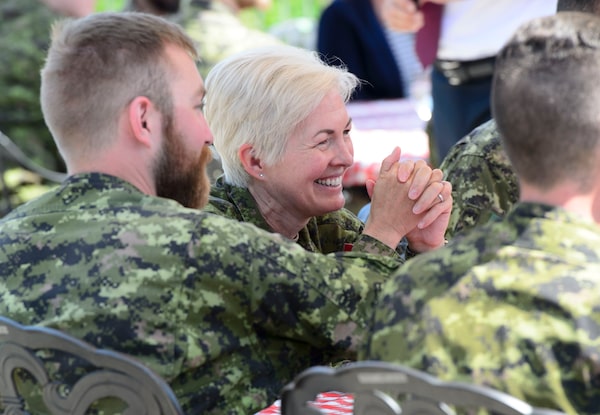
Brigadier-General Jennie Carignan of the Canadian Armed Forces joins soldiers during a lunch with Prime Minister Justin Trudeau and Secretary General of the North Atlantic Treaty Organization (NATO) Jens Stoltenberg at Canadian Forces Base Petawawa, Ont. on Monday, July 15, 2019.Sean Kilpatrick/The Canadian Press
NATO has called an emergency meeting to discuss the future of its military operation in Iraq, which is led by a Canadian officer and includes about 200 members of the Canadian Armed Forces.
The mission was suspended due to security concerns following the U.S. drone strike that killed General Qassem Soleimani, who headed the Quds Force, the special-operations arm of the Islamic Revolutionary Guards Corps. The fate of the mission remains in the balance after Iraq’s parliament called on Sunday for U.S. and other foreign troops to leave the country.
On Monday, ambassadors from the North Atlantic Treaty Organization will be discussing the situation in the Middle East, including the future of NATO Mission Iraq, which is under the command of Major-General Jennie Carignan of the Canadian Armed Forces. The meeting was organized by NATO Secretary-General Jens Stoltenberg after consultations with members of the alliance.
The Canadian government has been calling for restraint from all parties involved in the international crisis.
“We continue to monitor and evaluate the situation, and remain in close coordination with our international partners. Our goal remains a united and stable Iraq, and preventing the re-emergence of Daesh [the Islamic State},” Todd Lane, a spokesman for Defence Minister Harjit Sajjan, said in a statement on Sunday.
The NATO mission in Baghdad was established in the fall of 2018 after three years of war against the Islamic State as a “train and assist” mission to help Iraqi security forces and government institutions keep IS from regaining a foothold in the country.
Iran has vowed to retaliate for the assassination of Gen. Soleimani, whose killing at Baghdad’s airport has thrown the region into chaos.
Over the weekend, Mr. Sajjan said all Canadian operations in Iraq are being “suspended temporarily as we continue to monitor the security environment. We are taking all necessary precautions for the safety and security of our civilian and military personnel.”
Thomas Juneau, a Middle East expert at the University of Ottawa, said the Canadian government needs to get ready to take its military members out of Iraq.
“We are in completely uncharted territory, we don’t know what will happen next, whether our forces are expelled from Iraq or not. That being said, we definitely have to prepare for that,” he said. “If the United States is asked to leave, so do we. Canada and other smaller western countries are not able to sustain a mission like this without the U.S.”
Mr. Juneau said the Canadian government is walking a fine line in its response to the situation in an apparent bid to avoid being dragged further into the conflict.
“We are a minor player in the current dispute between Iran, Iraq and the United States and at this point, there is very little that we can do to shape these events,” he said.
NDP MP Heather McPherson called on the Canadian government to be more open about its role in the current crisis.
“We need to know how this government is going to move forward, how this government is going to de-escalate this situation,” she said.
The suspension of NATO’s training mission does not affect the U.S.-led Operation Impact, under which Canada has approximately 600 soldiers serving as trainers and advisers.
Operation Impact, which is run out of Kuwait as part of operations in Iraq, Jordan and Lebanon, includes air operations, explosive threat training, advising Iraqi forces and regional capacity building. The RCMP also lead 12 Canadian police officers in Iraq, including members of the Ontario Provincial Police, Sûreté du Québec, Saskatoon and Halifax police.
On Friday, Foreign Affairs Minister François-Philippe Champagne said the safety and well-being of Canadians in Iraq and the region are Canada’s “paramount concern.”
“We call on all sides to exercise restraint and pursue de-escalation," he said.
Canada’s travel website on Iraq already advises against all travel there because of a volatile, unpredictable and potentially dangerous situation. It was updated last week to include information on the killing of the Iranian military commander.
“This attack has led to increased tensions in the region,” the website said. “The security situation could worsen with little warning. There is an increased threat of attacks against Western interests and of terrorist attacks in general.”
Our Morning Update and Evening Update newsletters are written by Globe editors, giving you a concise summary of the day’s most important headlines. Sign up today.